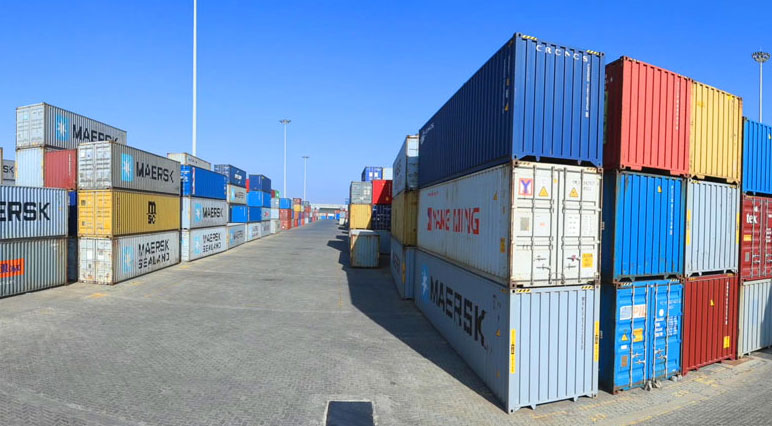
Radar | Sep 08,2019
Dec 16 , 2023
By Mekonnen Solomon
Flower exporters, traditionally reliant on air transport, have embarked on a groundbreaking venture by initiating the export of cut flowers to Europe through the sea.
Earlier this month marked a substantial change in the logistics of flower exports from Ethiopia after the first partial trial shipment loaded in refrigerated trucks carrying approximately 468 boxes of flowers, totalling nearly 190,476 stems, or 7,722Kg was shipped. This consignment, meticulously maintained at two degrees Celcius, promises a new era in transporting perishable goods from Ethiopia to international markets.
Historically, flower exports have heavily depended on air transport, with Ethiopian Air Cargo leading the way. This reliance was supported by the Airline's robust infrastructure and facilities, ensuring competitive services for exporters. With a fleet of 16 freighters capable of carrying up to 95tns, Ethiopian Cargo has been instrumental in transporting close to 701,816tns of ornamental plants and cut flowers over the past decade. Though steady at 1.69 to 1.72 dollars for a kilogram, air cargo rates reflected the premium for speedy delivery to international markets, including 136 destinations across the globe.
The air freight option, while faster, is not without its constraints.
The limited capacity and weight restrictions of aircraft often lead to higher costs, especially during peak seasons. In contrast, sea freight presents a more cost-effective alternative, potentially reducing transportation costs by about half compared to air transportation. Besides economic advantages, sea freight also offers substantial environmental benefits. With lower fuel consumption and reduced greenhouse gas emissions, sea transport aligns with global efforts to respond to climate change and promote sustainability.
The larger capacity of ocean freight vessels accommodates significant cargo volumes, which is particularly advantageous during high-demand periods.
Despite these advantages, the shift to sea freight is not without its drawbacks. The prolonged transit time, typically four to five weeks, raises concerns about the quality and shelf life of the flowers. The key to maintaining flower quality during transit lies in efficient cold chain management and specialised packaging, which ensures that the flowers are kept at optimal temperatures throughout their journey. This requires seamless cold chain logistics, an important aspect of choosing a reliable logistics partner.
Maersk, the chosen shipping liner for transporting the cargo on December 4, 2023, and a global leader in logistics, is expected to play a crucial role in this transition.
The shift also poses strategic and operational challenges for Ethiopian exporters and buyers in Europe. The infrequent arrival of sea shipments demands rethinking inventory and supply chain management. For European importers, accustomed to almost daily air shipments, adapting to less frequent, larger sea shipments requires significant adjustments in processing and sales strategies. The change is particularly impactful in the florist industry, where the demand for fresh, high-quality products is necessary.
The preference for 'day fresh' products in the flower trade makes the adoption of sea freight a cautious and gradual process.
Adapting to market fluctuations and customer demands presents another hurdle for sea freight. In the volatile flower market, where demand can quickly shift due to weather changes, air freight's flexibility is a significant advantage. With its rigid schedules and longer transit times, sea freight limits this flexibility, challenging businesses to anticipate and plan for market trends and customer preferences more effectively.
Another aspect to consider is the suitability of different flower varieties for sea freight. Experience has shown that certain flowers, particularly those with softer petals or specific colours, are more susceptible to damage during extended sea transit. It raises concerns about the range of products that can feasibly be transported through the sea, potentially limiting the variety of flowers available to European buyers.
Moving to sea freight is a significant step forward for the Ethiopian flower industry. It reflects a broader trend in global logistics, where cost-effectiveness, environmental considerations, and capacity needs are increasingly shaping transportation choices. While the transition may not be smooth or immediate, the initiative taken by flower exporters like Herbrg Rose and Sher Ethiopia PLC demonstrates a willingness to innovate and adapt to changing market dynamics and environmental concerns.
The experiences of other East African countries in sea freight, while mixed, offer valuable lessons for Ethiopia.
Issues such as quality control, cold chain management, and the need for specialised packaging are critical areas where exporters can learn and improve. Addressing challenges related to high inland transportation costs and frequent delays in the supply chain will be crucial for the success of this new venture.
PUBLISHED ON
Dec 16,2023 [ VOL
24 , NO
1233]


Radar | Sep 08,2019

Radar | Sep 17,2022

Radar | Feb 19,2022

Fortune News | May 18,2019

View From Arada | Feb 24,2024

Fortune News | Apr 06,2019

Radar | May 25,2019

Life Matters | May 11,2024

Radar | Oct 09,2021

Commentaries | Jun 22,2024

Photo Gallery | 175454 Views | May 06,2019

Photo Gallery | 165675 Views | Apr 26,2019

Photo Gallery | 156016 Views | Oct 06,2021

My Opinion | 136819 Views | Aug 14,2021

Dec 22 , 2024 . By TIZITA SHEWAFERAW
Charged with transforming colossal state-owned enterprises into modern and competitiv...

Aug 18 , 2024 . By AKSAH ITALO
Although predictable Yonas Zerihun's job in the ride-hailing service is not immune to...

Jul 28 , 2024 . By TIZITA SHEWAFERAW
Unhabitual, perhaps too many, Samuel Gebreyohannes, 38, used to occasionally enjoy a couple of beers at breakfast. However, he recently swit...

Jul 13 , 2024 . By AKSAH ITALO
Investors who rely on tractors, trucks, and field vehicles for commuting, transporting commodities, and f...

Oct 18 , 2025
The political establishment, notably the ruling party and its top brass, has become p...

Oct 11 , 2025
Ladislas Farago, a roving Associated Press (AP) correspondent, arrived in Ethiopia in...

Oct 4 , 2025
Eyob Tekalegn (PhD) had been in the Governor's chair for only weeks when, on Septembe...

Sep 27 , 2025
Four years into an experiment with “shock therapy” in education, the national moo...

Oct 18 , 2025 . By NAHOM AYELE
In a sweeping reform that upends nearly a decade of uniform health insurance contribu...

Oct 18 , 2025 . By BEZAWIT HULUAGER
A bill that could transform the nutritional state sits in a limbo, even as the countr...

Oct 18 , 2025 . By SURAFEL MULUGETA
A long-planned directive to curb carbon emissions from fossil-fuel-powered vehicles h...

Oct 18 , 2025 . By BEZAWIT HULUAGER
Transaction advisors working with companies that hold over a quarter of a billion Bir...